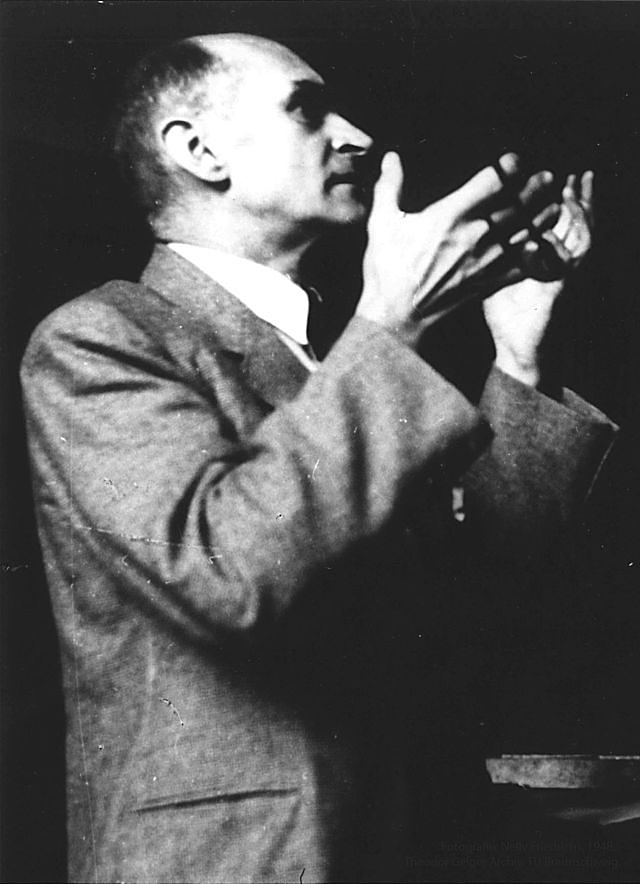A contemporary sociological classic Five questions to Dr. Nicole Holzhauser on the contemporary relevance of former Braunschweig professor Theodor Geiger
“Theodor Geiger’s work shows how important it is to reflect on and learn from our history as a scientific community,” says Dr. Nicole Holzhauser. The research associate at the Institute of Sociology and head of the Theodor Geiger Archive has examined how the first professor of sociology at the Technische Hochschule Braunschweig systematically incorporated National Socialism into his research even before 1933, and how he did so in the context of the local political environment in Braunschweig. Despite increasing political repression, he analysed the dynamics and dangers of this movement and its embedding in the social structure in a way that is still topical and relevant today.

Dr. Nicole Holzhauser, head of the Theodor Geiger Archive. Photo credit: Annette Dölger/TU Braunschweig
You are the head of the Theodor Geiger Archive at TU Braunschweig. Who was Theodor Geiger?
Theodor Geiger (1891-1952) was a German sociologist and the first professor of sociology at the Technische Hochschule Braunschweig, now TU Braunschweig. Geiger was a pioneer in several areas of sociology, including social structure analysis and social mobility research, sociology of law, and political sociology. He was one of the few people to have studied and explicitly criticised National Socialism before 1933. One of his most famous works, “Die soziale Schichtung des deutschen Volkes“ (The Social Stratification of the German People) (1932), was written in a politically extremely tense environment, when the NSDAP already had significant influence in Braunschweig. During this time, he analysed how the political rise of National Socialism came about and the role played by the middle classes. Like so many academics at the TH Braunschweig, Geiger was dismissed from his post in 1933. He fled to Denmark, where he became Scandinavia’s first professor of sociology in 1938.
Geiger was also an incredibly interesting and exciting person. Not only did he engage with the pressing issues of his time, but he didn’t mince his words in academic discourse with his colleagues, seemingly unimpressed by authority. He was quick and sharp in his thinking, honest in his criticism and often simply very funny. He was very popular with his students, thanks to his engaging and humorous manner, his dedicated and enthusiastic way of lecturing, and his many accessible examples from the non-academic world, such as crime novels. At the same time, judging by his writings, he was of a rare seriousness and honesty in the matter. The social task that he ascribed to intellectuals in society – to analyse, criticise and oppose – was something that he lived by himself. With his research, he fought against totalitarian ideologies and for social enlightenment. His works are still relevant today – and not just for sociology.
Geiger is considered the founder of stratification analysis. What was so groundbreaking about his work “Die soziale Schichtung des deutschen Volkes. Ein sociographischer Versuch auf statistischer Grundlage” (The Social Stratification of the German People. A Sociographic Attempt on a Statistical Basis)?
The 1932 book provided the first systematic and empirically based analysis of social stratification in Germany. Geiger developed a five-part stratification model that analysed social structures on the basis of statistical data and highlighted different dimensions of social inequality. This model was later used as a basis for the development of other stratification models. His analysis of the old and new middle classes in the context of the rise of National Socialism is particularly noteworthy. Geiger identified the fear of decline of the old middle class (such as craftspeople and small business owners) and the attempts of the new emerging middle class to distance itself from the workers (such as the new white-collar workers who wanted to distance themselves from the blue-collar workers) as key factors in the initial successes of National Socialism. He showed that these groups were particularly susceptible to totalitarian ideologies in the face of economic insecurity and social disorientation. Later, he also analysed how social democracy indirectly contributed to the rise of National Socialism through its refusal to open up to the centre of society. Geiger’s approach of linking social and economic positions with subjective mentalities laid the foundations for modern social structure analysis and still offers a valuable perspective for understanding social and political developments today.
You recently published a book on Geiger’s sociological research into the rise of fascism. What did you investigate?
In my essay, I analysed the scientific and political conditions under which Geiger developed his work at the TH Braunschweig, particularly under the influence of the rise of National Socialism. This shows how strongly science and the university as its institutional home are ultimately dependent on social conditions. Using Geiger as an example, I have traced the history of sociology and shown how National Socialist policies and their influence on the educational system drastically changed academic life at the university and, indirectly, academic work – even before 1933.
Geiger found himself in a politically charged atmosphere in which the NSDAP was already a coalition partner in the state of Braunschweig from 1930 and was exercising increasing control over the education sector. The publication sheds light on how Geiger remained critical in the face of an ominous backdrop that was already clearly noticeable in Braunschweig and could no longer be ignored personally. Although Geiger recognised the dangers of fascism early on, he, like many of his contemporaries, underestimated its actual extent in the early 1930s.
Why is Theodor Geiger still relevant today?

Theodor Geiger on his last and only visit to Braunschweig after the Second World War in August 1948. Photographer: Nelly Friedrichs © Theodor Geiger Archive, Technische Universität Braunschweig
Geiger is relevant today because he developed key concepts for social analysis and emphasised the importance of scientific methodology and data-based analysis. His thoughts and concepts on the “immunisation” of society also address key challenges of our time.
Geiger’s idea of “immunisation” aims to make society resistant to extremist and totalitarian ideologies through education and enlightenment. In his late work “Demokratie ohne Dogma“ (Democracy Without Dogma) (1953), he argues for a democratic society that is not based on rigid ideologies and fixed rules, but is essentially characterised by critical thinking and intellectual humanism. With the resurgence of populist and extremist movements in many countries, including Germany, such immunisation against ideological manipulation would be particularly important. Geiger’s work emphasises the importance of a sound education accessible to all and the promotion of critical awareness for the preservation of an open and democratic society.
But Geiger’s enduring importance to the discipline is also due to his explicitly scientific methodology. His work is characterised not only by the empirical testing of hypotheses, but also by a rigorous, theoretically grounded approach. His aim was to analyse, record and systematise social developments in such a way that they could be understood both in their totality and in their detail, i.e. at both macro and micro levels. He combined theoretical considerations with empirical investigations to create a comprehensive picture of social reality. By combining theoretical and related conceptual foundations with empirical testing, Geiger created a robust empirical methodology that can still serve as an ideal for social science research today.
Why should universities engage more intensively with such historical figures?
Ideally, universities fulfil the extremely important function for a society of observing social developments from a critical distance, analysing them rationally and reflecting them (back) to society. The fulfilment of this function presupposes that the members of the university, especially the university teachers, have the necessary skills. It also requires an appropriate “mindset“. This applies not only to the humanities and social sciences, but also to the natural and engineering sciences, whose results and technological developments have a particular impact on society. Here, role models such as Geiger – especially if they have a local reference and strive to formulate clear and comprehensible concepts – can help to visualise the aforementioned function and the intellectual tasks associated with it in an exemplary manner.
Geiger shows us the importance of scientific independence, academic freedom and the role of science in times of political crisis. By looking at his work, we can better understand what happened in the past and how it relates to the present. We can also learn from people like him how to face current social challenges and take responsibility.
